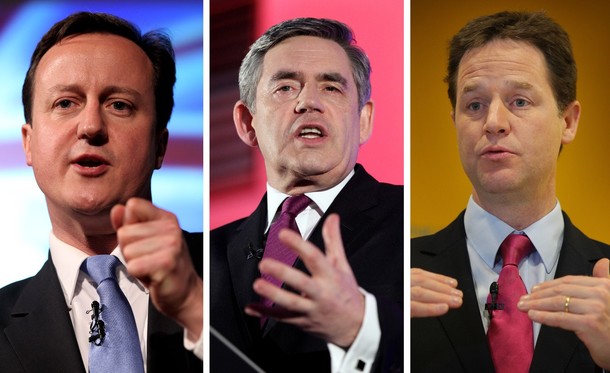
Like the 2000 American presidential elections, the results of the 2010 parliamentary elections are drawing some attention to some oddities in the system and bringing calls for reform. Most likely, the Brits will follow the lead of their American cousins and make no significant changes.
Britain’s hung parliament, the first since 1974, is the result of the unusual combination of a First Past the Post, Single Member District institutional framework with so many seats (650) that small parties with strong regional appeal can win significant numbers of seats.
On it’s face, the election was a repudiation of the ruling Labour Party, which has governed since 1997. They did lose 86 and their chief rival, the Conservatives (or Tories) gained 92. Yet, because neither major party won a majority, it’s theoretically possible that either of them could cobble together a governing coalition.
If Gordon Brown somehow emerged as prime minister after all this, would he be legitimate?
Further, while Nick Clegg and his Liberal Democrats had a very disappointing showing after the "Cleggmania" that followed the first debate, they did in fact get 23 percent of the national vote, compared to Labour’s 29. But, because Labour’s votes were more concentrated geographically, they’ll win a projected 258 seats while the Lib Dems will get a paltry 57 — actually five fewer than they had going in!
Talking Points Memo publisher Josh Marshall noted the parallels with the 2000 election:
What reminds me of Bush v. Gore is the jousting and muscling for one or another to just get out. The Tories are making dramatic statements about Labour’s "humiliating" defeat and that, as David Cameron said, it’s "clear that the Labour government has lost its mandate to govern."
Don’t get me wrong. Those statements are hard to quibble with. But obviously numbers should speak for themselves. But it’s in these cases where the actual result is unknown but also ambiguous that you’ve got these chest-thumping efforts to force the other guy off the stage, to create a fait accompli where the votes won’t quite do it themselves.
The comparison is apt in some ways. After all, Al Gore not only won more votes than George W. Bush nation-wide, but he’d have easily won Florida and several other states he narrowly lost were it not for the candidacy of Ralph Nader, who siphoned votes from the far left of the Democratic base.
Moreover, in both cases, the public seemed surprised by how their own system worked. American presidents are elected through the device of the Electoral College which, after reforms in the early 1800s, became a mechanism for translating the popular vote in each of the several states. Ordinarily, this is transparent because the Electoral vote winner has almost always been the candidate that received more overall votes; but that’s just an accident of mathematics.
Similarly, the UK’s system typically conforms to Duverger’s Law and entices people to vote for either Labour or the Tories, with only a handful of outliers going to the small parties. But, from time to time, the combination of political climate, a charismatic candidate for one of the minor parties, and weak candidates for the major parties leads to a stalemate. When that happens, wheeling and dealing ensues and strange outcomes become possible.
Indeed, while the dramatic name "hung parliament" suggests something extraordinary, as Troy political scientist Steven Taylor notes, it’s actually quite ordinary. Indeed, it’s quite rare in a parliamentary system for a single party to win outright; coalitions are the norm throughout most of the Western world. (There’s also the amusing fact that "hung" translates differently in the American idiom than that of the language’s inventors. On that score, Tennessee law professor Glenn Reynolds gets off the funniest family-friendly quip: "Can we do the same thing with Congress?")
My strong guess is that the UK electoral system is in little danger of changing as a result of misgivings over these election returns.
In the American case, calls for getting rid of the Electoral College soon faded away for the very reasons it was instituted in the first place: The very small states have no desire to give up their slightly outsized power and the very large states are perfectly happy, thank you, to vote as a bloc and thus amplify their power.
Similarly, the Brits have a very strong attachment to local districts and it’s virtually inconceivable that they’d switch to a proportional system. Indeed, while doing so would preclude whatever injustice results from the Lib Dems getting far fewer seats than their share of the vote suggestions, PR would actually much it much, much less likely that a single party would win outright, thus making coalition government even more likely.
Further, as Nick Clegg’s former boss, Christopher Hitchens, points out,
This should not have come as such a surprise. If you exempt the appeal of strictly local nationalist parties in Scotland, Wales, and Northern Ireland, British society is actually a three-party system stitched and corseted into a two-party duopoly. The duopoly is reinforced by the apportionment of seats in Parliament, which fails to reflect the number of votes cast for each party and instead bases itself on a winner-take-all regime. About once every generation this breaks down.
But only temporarily. A key difference in our system mitigates whatever bitterness ensues: American president who wins under controversial circumstances holds power for a fixed four years, whereas a British premier with a weak hold on power may be forced to call for new elections quite early. Most expect that will happen in this case, whomever emerges as the winner.
James Joyner is managing editor of the Atlantic Council. Photo credit: Getty Images.
Image: cameron-brown-clegg.jpg
